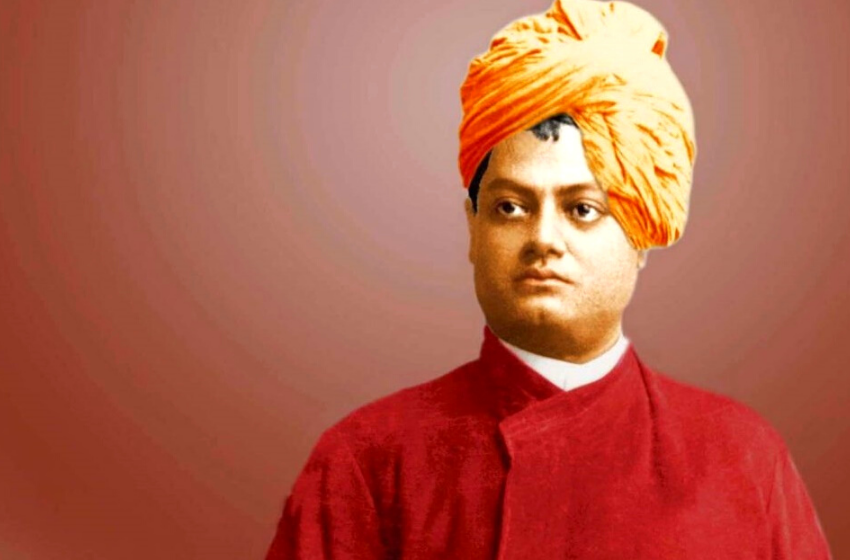Swami Vivekananda – A Spiritual Genius

Swami Vivekananda was a spiritual genius of preeminent leadership and the icon crammed immense work and achievement into his life. His passion for knowledge concerning God and Hinduism took him to Sri Ramakrishna. He made Sri Ramakrishna, his master, who gave him God’s vision, clear his doubts, and inspired him to teach and changed him into a philosopher. Swami Ji played a major role in originating India’s philosophy of Yoga and Vedanta in the Western world. He was the leading one among the modern philosophers of our country.
Swami Vivekananda was a Hindu monk. He was more than just a spiritual mind. He was responsible for the restoration of Hindu spiritualism and established Hinduism as a revered religion on the world stage. His views of universal brotherhood and self-awakening prevail relevant particularly in the current backdrop of widespread political turbulence around the world. Swami Ji’s teachings have been an influence to many, and his words have become goals of self-improvement especially for the youth of the country. Because of this, his birthday, January 12, is celebrated as the National Youth Day in India.
Table of Contents
Early Life and Education
Swami Vivekananda was born on 12 January 1863, on the occasion of Makar Sankranti in a rich Bengali family in Calcutta. He was one of the eight children of Bhuvaneshwari Devi and Vishwanath Dutta. His birth name was Narendranath Dutta. Father Vishwanath was a successful lawyer with a significant impact on society. His mother Bhuvaneshwari was a woman enriched with a strong, God-fearing mind who had a great influence on her son.
As a young boy, Narendranath displayed sharp intellect. His naughty nature denied his interest in music, both instrumental as well as vocal. He exceeded in his studies as well, first at the Metropolitan Institution, and later at the Presidency College in Calcutta. By the time he graduated from college, he had gained a vast knowledge of different subjects. He was good in sports, gymnastics, wrestling, and bodybuilding. He was an enthusiastic reader and read up on about everything under the sun. He studied the Hindu scriptures like the Bhagavad Gita and the Upanishads as well as he studied western philosophy, history, and spirituality by David Hume, Johann Gottlieb Fichte, and Herbert Spencer.
Swami Vivekananda Ji’s Contributions to Hinduism
The main contributions to hinduism of Swami Ji’s are:
1. Unification
Before Swami Ji came, there was a lot of dispute and competition among the different sects of Hinduism. Likewise, the leaders of different systems and schools of philosophy were commanding their views to be the only true and valid ones. By applying Sri Ramakrishna’s doctrine of Harmony. Swami Ji brought the overall unification of Hinduism based on the principle of unity in diversity.
2. Identity
It was Swami Vivekananda who gave to Hinduism as a whole a clear-cut identity, a distinct profile. He was the first person, as supervised by his Master Sri Ramakrishna, to accept all Hindu beliefs and the views of all Hindu philosophers and sects as different perspectives of one total view of truth and way of life known as Hinduism.
3. Defense
Another important service contributed by Swami Ji was to raise his voice in defense of Hinduism. Christian missionary promotion had given a wrong understanding of Hinduism and India in Western minds. Swamiji had to face a lot of resentment in his attempts to defend Hinduism.
4. Meeting the Challenges
At the end of the 19th century, India in general, and Hinduism in particular, faced serious hurdles from Western materialistic life, the ideas of Western free society, and the proselytising activities of Christians. Swami Ji faced these challenges by integrating the best elements of Western culture into Hindu culture.
5. New Ideal of Monasticism
A main contribution of Vivekananda to Hinduism is the revival and modernization of monasticism. Vivekananda promoted social service to the status of divine service.
6. Refurbishing of Hindu Philosophy and Religious Beliefs
Vivekananda did not merely interpret ancient Hindu scriptures and philosophical ideas in terms of modern thought. He also enumerated numerous illuminating original concepts based on his own original experiences and vision of the future. This, however, requires a detailed study of Hindu philosophy which cannot be endeavored here.
The main contributions that Swami Vivekananda made to the modern world
1. New Understanding of Religion
One of the most important contributions of Swami Vivekananda to the modern world is his explanation of religion as a universal experience of transcendent truth, common to all humanity. Swami Ji met the challenge of modern science by pointing that religion is as scientific as science itself religion is the science of consciousness.
2. New View of Man
Vivekananda’s concept of the potential divinity of the soul’ gives a new, ennobling concept of man. The present age is the age of humanism which endures that man should be the main concern and center of all actions and thinking. By science and technology, man has achieved great prosperity and power, and modern methods of communication and travel have changed human society into a global village. Swami Ji has set the foundation for spiritual humanism, which is revealing itself through several neo-humanistic movements and the current interest in meditation, Zen, etc all over the world.
3. New Principle of Morality and Ethics
The prevalent morality, in both individual life and social life, is mostly based on fear – fear of the police, fear of public contempt, fear of God’s punishment, fear of Karma, and so on. The modern theories of ethics also do not justify why a person should be moral and be good to others. Swami Ji has given a new theory of values and a new principle of morality based on natural purity and oneness. We should be pure because purity is our real nature, our true divine Self or Atman. Likewise, we should love and help our neighbors because we are all one in the Supreme Spirit acknowledged as Paramatman or Brahman.
4. Bridge between the East and the West
Another prominent contribution of Swami Ji was to construct a bridge between Indian culture and Western culture. He did it by rendering Hindu scriptures and philosophy and the Hindu way of life and institutions to the Western people in an idiom which they could understand. He made the Western people realize that they had to learn much from Indian spirituality for their own well-being.
Swami Vivekananda – Death
Swami Vivekananda was suffering from many health issues such as chronic insomnia, asthma, and diabetes. Swami Ji was died on July 4, 1902, while meditating at Belur Math. According to his discipline, the legend Swami Vivekananda achieved Mahāsamādhi. It is said that Swami Vivekananda met his prediction that he will not live forty years. The Iconic personality was cremated on the bank of Ganga (River Ganges) on a sandalwood funeral pyre in Belur just opposite the place where his Guru Shri Ramakrishna has cremated sixteen years ago. Swami Vivekananda’s writings and lectures have been assembled into nine volumes.
Legacy
Swami Vivekananda explained to the world the true foundations of India’s unity as a nation. He taught how a feeling of humanity and brotherhood could bind together a nation with such a vast diversity. Vivekananda highlighted the points of disadvantages of western culture and the enrichment of India to overcome those. And that is why he is great. Our countrymen have gained miraculous self-respect, self-reliance, and self-assertion from his teachings. Swami Ji was successful in building a virtual bridge between the culture of the East and the West. He interpreted the Hindu scriptures, philosophy, and way of life to the Western people. Swami Ji made them apprehend that despite poverty and backwardness, India had a great contribution to make to world culture. He played a great role in ending India’s cultural isolation from the rest of the world.
Frequently Asked Questions
Q1. What are the main contributions swami Vivekanand made for the world?
Ans. The contributions made by Swami Vivekanand for the world are: New understanding of religion, New view of Man, New principles of moral and ethics, and bridge between the east and the west.
Q2. What Swami Vivekanand did for Hinduism?
Ans. Swami Vivekanand unified the Hindus, He gave a clear cut identity to Hinduism, he defended Hinduism at the time when christian missionary spread the wrong idea about Hindus, He integrated the best of western cultures in Hinduism, he developed a new idea of monasticism and he refurbished Hindu philosophies and religious beliefs.
Q3. Why did Swami Vivekanand’s birthday is celebrated as the National Youth Day in India?
Ans. Swami Vivekanand birthday is celebrated as the National Youth Day in India because of the contributions done by the Swamiji for the betterment of Indian youth. His words brought self-improvement to the Indian youth.
Q4. When did Swami Vivekanand die?
Ans. Swami Vivekanand died at the age of 39 on 4th July 1902.
Q5. What was the Date of Birth of Swami Vivekanand and where was he born?
Ans. Swami Vivekanand was born in Calcutta on 12th January 1863.
Q6. What was the birth name of Swami Vivekanand?
Ans. His birth name was Narendranath Dutta.





